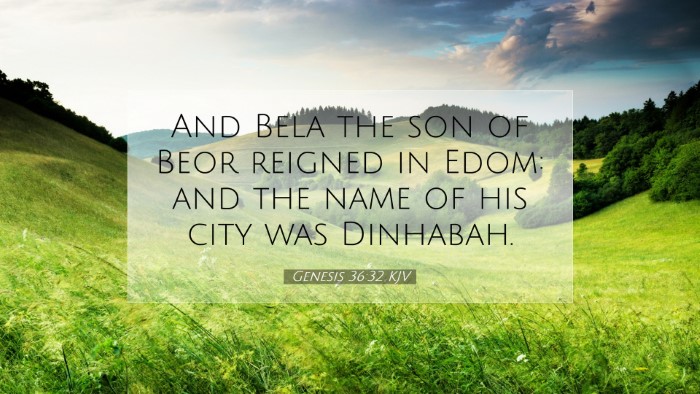Commentary on Genesis 36:32
Genesis 36:32 states: "And Bela the son of Beor reigned in Edom: and the name of his city was Dinhabah." This verse is part of the genealogical history of the Edomites and focuses on the kings who ruled during the era prior to the monarchy of Israel.
Contextual Overview
The chapter concludes a genealogical record that emphasizes the lineages of Esau, who is also known as Edom. It is essential to understand the significance of Edom in the biblical narrative, as it represents not just a lineage but also a nation with distinct cultural and spiritual characteristics.
Insights from Public Domain Commentaries
Matthew Henry's Commentary
Matthew Henry highlights that Bela, the son of Beor, signifies the transition of Edom from tribal affiliations to more structured governance. He notes that Dinhabah, the city mentioned, may not hold much significance in later biblical history, but it underscores the fact that kingship existed in Edom before it became a central theme elsewhere in the Scriptures.
Reign of Kings
Henry points out the import of recognizing that Edom had its series of kings, illustrating that even nations not directly part of Israel's covenant had their own governance and order. This serves to highlight God’s sovereignty over all nations, as He raises leaders and kingdoms according to His divine plan.
Albert Barnes' Notes
Albert Barnes elaborates on the importance of Bela's reign, stressing that the name Bela (meaning "to swallow") could signify both a predatory nature in leadership and also the fragility of power. The historical account reflects a time when Edom was establishing its identity apart from Israel.
Cultural Significance
Barnes notes that the Edomite kings were significant not only for their political power but also for their cultural influences in the region. Dinhabah, as the capital city, represents the interpersonal dynamics of Edom and is indicative of their civilization's development. He raises the question of the impact such governance has on the spiritual life of its citizens.
Adam Clarke's Commentary
Adam Clarke examines the geographical significance of Dinhabah in this passage. He proposes that the city served as a central location for commerce and governance in Edom, suggesting a blossoming society during Bela's rule. Clarke emphasizes how cities often functioned as symbols of a nation's strength and identity.
Connection to Israel's History
Clarke makes thoughtful connections to the broader narrative of the Scriptures, noting that the Edomite kings often interacted with Israel in friendship or enmity. He reflects on the implications of Edom’s lineage and governance for Israel’s own understanding of kingship and national identity.
Significance of Genealogies in the Bible
The genealogies found throughout the Bible serve several important purposes:
- Historical Record: They provide accounts of lineage that are crucial for understanding the development of nations, tribes, and peoples.
- Covenantal Identity: They illustrate God's promises to specific lineages, especially how they connect to the fulfillment of His covenant with Abraham, Isaac, and Jacob.
- Morality and Purpose: Through genealogies, we often see the moral failure and redemption arcs of different figures, providing continuing themes of sin and grace.
Theological Reflections
The brief mention of Bela and Dinhabah invites significant theological reflection:
- God’s Sovereign Rule: The naming of Edomite kings demonstrates God's overarching authority over nations and leaders, reminding readers that divine purpose prevails through historical occurrences.
- Cultural Identity: The Edomites, described here, reveal the complexity of human identity and the varied ways in which people establish themselves, highlighting the diversity within God's creation.
- God’s Plan of Redemption: The historical realities of nations like Edom serve to prepare the ground for the arrival of God's ultimate redemptive plan through Jesus Christ, emphasizing that all history is woven into God's story.
Conclusion
Genesis 36:32, while a brief mention in the context of a genealogy, carries significant weight as it evokes themes of governance, cultural identity, and God's sovereign rule over both Israel and the surrounding nations. The reflections from notable commentaries underscore its relevance in the broader narrative of Scripture, providing insight for pastors, students, and scholars alike in their understanding of the unfolding biblical story.


